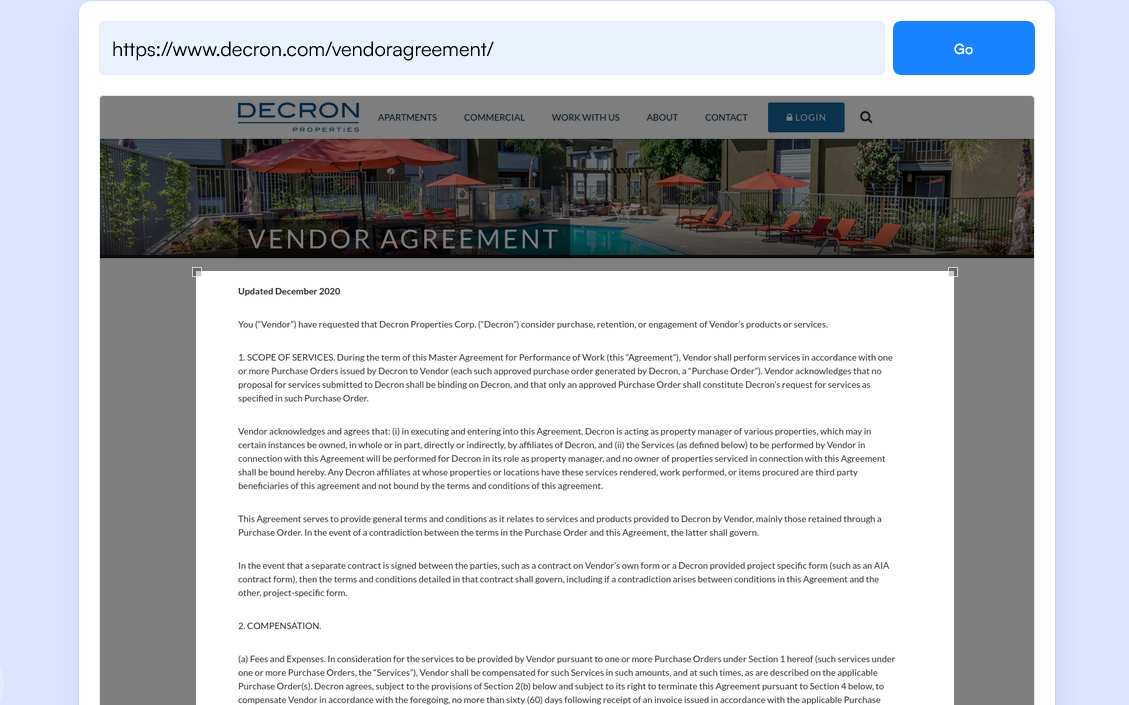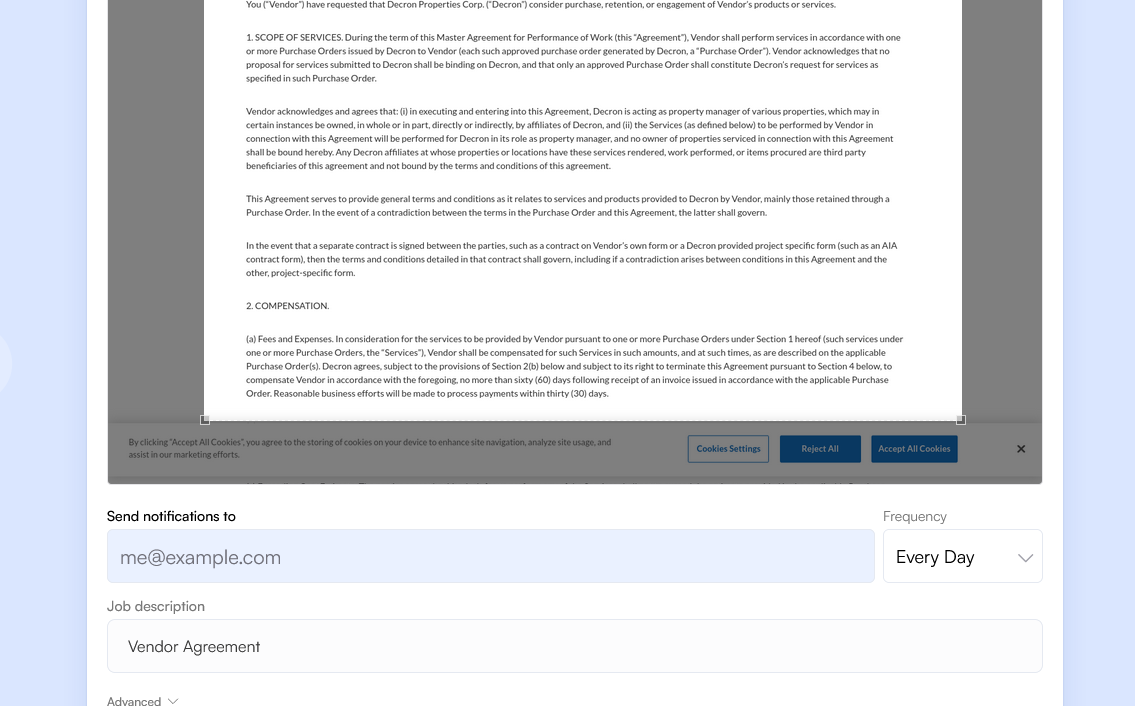How Ecommerce Sellers Can Monitor Terms of Service Updates
By Emily Fenton
Updated March 6, 2023

How Resellers Can Keep Tabs on Updated Terms & Conditions
Online product resellers can make good money without having to dedicate their business to a single manufacturer or distributor. With that added flexibility, though, comes some responsibility in making sure everything is properly managed.
Resellers often work at the discretion of the original manufacturers of goods and are thus subjected to the legal licensing and rights to use that go along with it. As companies don’t want to damage their reputation, they usually create legal terms & conditions that resellers must agree to for access to their goods.
While encountering regularly updated terms & conditions can become a headache, using the right e-commerce monitoring tools can make things a lot easier.
Why It’s Important to Stay Notified When a Brand You’re Reselling Changes Their Terms & Conditions or Other Important Legal Agreements
Most companies have stipulations in place for third-party retailers that sell their products. These stipulations can range from pricing requirements to quality standards, and sellers that fail to comply can have their right to sell revoked or face legal repercussions.
Bad consumer experiences, whether the result of unfair pricing, misleading sales tactics, or some other issue, will reflect poorly on the original brand, even if the issues are only caused by the third-party seller.
What Kinds of Stipulations Do T&Cs and Reseller Agreements Include?
With so many things to consider, it’s generally seen as good practice to understand the types of regulations used in reseller agreements. Companies can use standardized sections and inclusions in their legal agreements to make sure third-party retailers live up to their contractual obligations.
Resale Rights and Obligations
Perhaps the most important thing for a third-party reseller to understand is their right to resell products, along with any obligations that they’re required to fulfill. Most contracts will stipulate that the goods sold are considered materially different and aren’t protected by any trademark.
Marketing Rights and Obligations
Another thing to keep in mind when reselling products is your right to market them in accordance with your contract obligations. Just because you’re selling a company’s product doesn’t mean you can use their brand however you want.
Resellers take on the responsibility and liability of the product, and they aren’t allowed to use language that indicates that they’re the official seller. Companies usually have strict requirements that limit how the products can be listed or marketed to consumers.
Fees
Prices aren’t always so straightforward when reselling items, as additional costs, fees, and taxes can be levied against third-party sellers, depending on how they do business.
Of course, if you want to make money, you’ll have to account for any ongoing charges that you may be held to in order to retain your rights to the product. That, in addition to other unexpected expenses, can really start to add up.
Invoicing and Payment Stipulations
Third-party sellers might have to use certain invoicing or payment methods when contracting with another company. Invoice dates, payment amounts, and periods may all be required to be reported so that companies can make sure you aren't overcharging or using insecure payment methods when dealing with clients.
These stipulations are meant to help sellers meet their sales targets and use resources efficiently while maintaining brand integrity.
Term of Agreement and Termination
Resellers also need to understand the terms and conditions outlined in their contract along with any circumstances that could lead to their termination. Reviewing these key details in your reseller agreement will allow you to maintain best practices and avoid any unwanted issues with partners.
Warranties
Warranties allow product manufacturers to guarantee the quality of their items for a certain period of time by offering exchanges for damaged goods. For the most part, companies will want resellers to let their buyers know that official warranties, returns, or any other original equipment manufacturer (OEM) responsibilities aren’t applicable to the purchase.
Indemnification
In a case where third-party sellers are required to compensate for losses, indemnification clauses will spell out who is held legally responsible. In most cases, the seller is expected to pay the consumer back for any issues or damaged items, but the trademark holder will not take on responsibility for resold products.
Limitation of Liability
Liability refers to legal actions that consumers can take against a company for damaged or faulty goods that caused some kind of personal harm or injury. A reseller clause will generally have language that limits the trademark holder’s responsibility if a suit is brought against the third-party.
Confidentiality
Many companies will hold third-party resellers to confidentiality agreements, which limit their exposure in marketing and other branding materials. These conditions are meant to protect the trademark holder from unwanted associations with other sellers in case something that could damage their reputation occurs.
Intellectual Property
Unique works or other products that are protected by trademarks are often covered by specific terms to ensure resellers can’t steal original ideas. Make sure you pay careful attention to any mentions of intellectual property if you’re selling software or any other licensed product that may be changed or altered at some point.
How to Use Visualping to Get Notified Immediately When a Company Updates Their Terms & Conditions Agreement
With so many factors to keep track of, it can be difficult to ensure you’re staying within the legal bounds of your contract when reselling items. With a reliable retailer monitoring and alerts system like Visualping, though, you can get notified whenever changes occur.
Getting started with Visualping is easy. You only need to complete a few simple steps:
Step 1: Copy the URL of the Web Page with the Terms and Conditions or Reseller Agreement, Then Paste It into the Search Field on Visualping’s Homepage
First off, you need to find the URL of the page that lists the terms and conditions or reseller agreement that you want to track. Copy it, go to the Visualping homepage, and paste it into the search field. You should now see the page loaded into the tool.
Step 2: Select the Part of the Page You Want to Monitor
Visualping allows you to select which part of the page you want to monitor, so you can limit the number of notifications you receive from the service. Choose the part of the page that lists the clause you’re interested in, and you’ll be ready to move on to the next step.

Step 3: Decide How Often You Want Visualping to Check for Changes
Now that Visualping knows where to look, you need to tell it how often it should check that area of the page for updates. You can select a frequency that’s as high as every five minutes or just have it checked once a month, depending on your needs.
Step 4: Enter the Email Address Where You Want to Receive Alerts
With everything ready, Visualping just needs an email address to send notifications to. Enter it now to receive updates whenever terms and conditions change on your tracked page.

Step 5: Check Your Email to Finish the Signup Process and Start Tracking!
For the final step, locate the message that was sent to you by Visualping. It will contain a link that takes you back to the Visualping website to complete your account activation. Now, you’re ready to start receiving notifications.
Keep Up with All Your Contracts by Using Visualping
Contract obligations are important, especially for resellers, and with so many different clauses and stipulations to keep up with, things can get messy pretty quickly if you don’t have the right management tools.
Visualping allows you to easily track the terms and conditions on any company website, making it easier than ever to ensure you stay up to date with monitoring compliance and don’t void any important contracts. Call Visualping today to see how it can help you track terms and conditions!
Sign up for the #1 web monitoring tool for for ecommerce
Get notified of any impactful ecommerce updates - like prices, inventory, SEO and brand reputation - from anywhere online.
Emily Fenton
Emily is the Product Marketing Manager at Visualping. She has a degree in English Literature and a Masters in Management. When she’s not researching and writing about all things Visualping, she loves exploring new restaurants, playing guitar and petting her cats